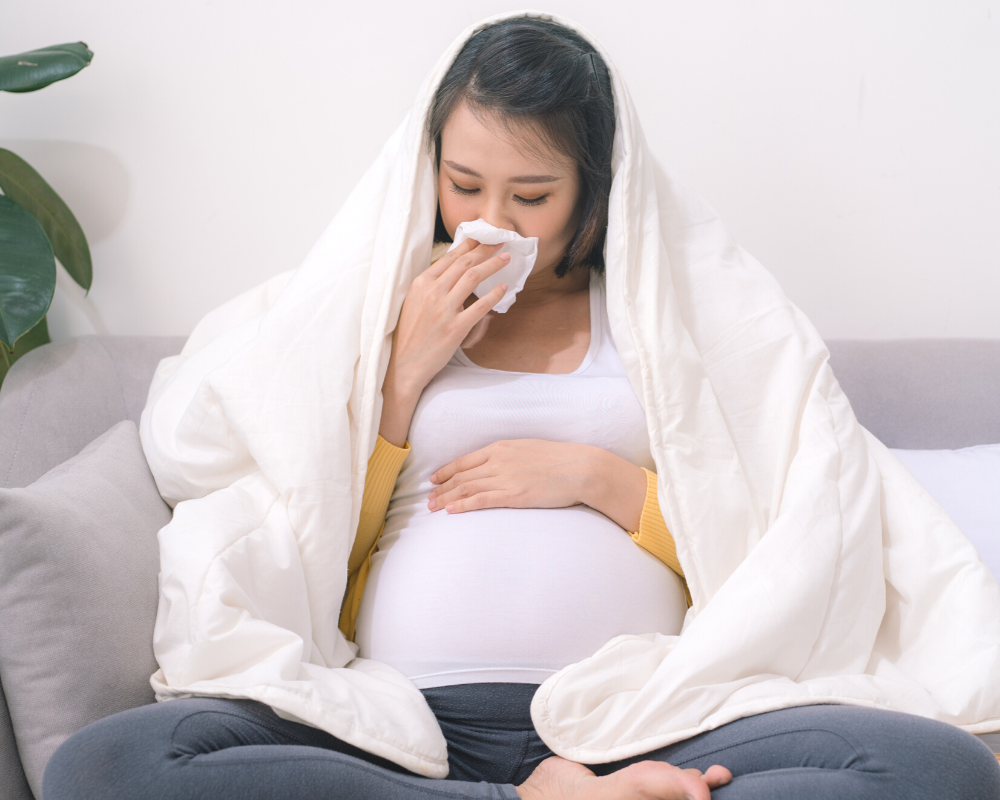In this article, we list out the dos and don’ts of managing the flu while you are pregnant to keep you and your baby safe.
In recent times where COVID-19 is running rampant, you can’t be too careful about flu and colds. Getting pregnant also leaves you more vulnerable to viral infections as your body undergoes changes in your heart, lungs, and immune system. But do you know the difference between a cold and the flu? The two are often confused for the same, as both illnesses has similar symptoms.
Cold Vs Flu

A cold is defined as virus infection of the nose, throat, sinuses and upper respiratory organs. Symptoms include runny nose, sneezing, sore throat and coughing and usually last for a week. There is no cure for a cold at the moment, and most people recover on their own without medical treatment. Colds also do not develop into the flu as both illnesses are caused by different viruses.
The flu has similar symptoms as a cold, however, it is a much more serious respiratory illness and the symptoms generally last longer. If you have caught the flu bug, you may have a fever, muscle aches, and cold-like symptoms that come on strong at the onset. You may continue to feel ill for several weeks. In certain cases, flu symptoms may worsen and become pneumonia, bacterial infection, and even hospitalization in serious cases. As a matter of fact, pregnant women are more likely to be hospitalized from flu complications than other women of similar age.
Flu is caused by influenza viruses. Contrary to popular opinion, antibiotics don’t work against colds and flu. In most cases, the best way is to let the infection runs its course and allow your body’s own immune system to fight off the virus.
Having a Cold or Flu During Pregnancy

If you have caught a cold while pregnant, just drink plenty of fluids and get more rest to allow your body to fight off the cold. As new mothers, your developing baby will cause your womb to expand and press against your lungs, which is why you may find breathing to be more laborious. This condition is exacerbated more so if you catch a cold and find your noses blocked! The good news is, you can alleviate these symptoms by taking over-the-counter medications such as Panadol, cough drops, or Decolgen. Rest assured that catching a cold is unlikely to harm you or your baby.
However, if you have caught the flu while you are pregnant, consult your doctor as soon as possible. Getting the correct diagnosis earlier can get you treated faster and ensure that you and your baby are safe. Your doctor may prescribe antiviral medicines for you as having the flu increases your chances of pregnancy complications down the road. For example, fever may harm your baby and is often associated with neural tube defects, premature birth, and miscarriage.
Medication

Antiviral medication is not to be confused with antibiotics – most antibiotics work by killing the pathogens, while antiviral medications treat viral infections by limiting the progress of the virus. The antiviral medication works best when taken within 48 hours of flu-like symptoms developing, and while it will not cure the flu, it will certainly help decrease the symptoms and prevent further medical complications. High fever is potentially dangerous, hence you will need to take medication to reduce the fever. Paracetamol (the active ingredient in Panadol) is a pregnancy-safe option for treating headaches, fever, body aches and other moderate pain associated with flu. Avoid non-steroidal anti-inflammatory medicines (NSAID) such as Ibuprofen and aspirin as these medications may increase the risk of miscarriage. However as with any medication taken during pregnancy, it is always best to use the lowest dose for the least period of time.
Cold and Flu Natural Home Remedies

If your symptoms are mild, why not try using natural home remedies such as honey, lemon and saltwater for some relief? A couple of teaspoons of honey mixed with hot water and lemon provides the much-needed relief for those pesky sore throats. Sea salt is also a natural antiseptic, hence gargling with sea salt can shorten the time you spend sick as it kills viruses. If you have a blocked nose, a non-steroidal decongestant spray may help. Nasal sprays made from sea salt have been proven to soften mucus and clear the nasal passageway. Last but not very least, resting well, keeping warm and drinking plenty of fluids will also help you recover faster.
Flu Vaccinations for Pregnant Women

As best as antiviral medications may work, it is still no substitute for a flu shot. This is why it is always recommended to get a vaccination to prevent the flu. People who caught the flu after receiving a flu shot often have much milder symptoms than those who have not been vaccinated. In pregnant women, flu shots reduce the risk of contracting serious respiratory infection by half. Vaccinated pregnant women are also 40% less likely to be hospitalized.
You may be wondering, is it safe for me to get a flu shot while I am pregnant? Yes, it is completely safe! You can get a flu shot at any stage of your pregnancy as well. Neither does flu vaccinations affect breastfeeding in any manner. In fact, your little one will have a stronger immunity as mothers are known to pass on antibodies to their babies in the womb and through breast milk. Your little one will be protected for up to 6 months after childbirth, which is a huge plus since at this period babies are too young to be vaccinated.
To guard against the flu, it is recommended that pregnant women should get a flu shot every year as the influenza virus mutates all the time. This is the reason why flu shots change by the year. Even if you have gotten a flu shot previously, you will still need to get a new shot annually. The phrase “prevention is better than cure” has never been more true when it comes to your health!

